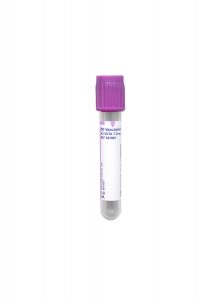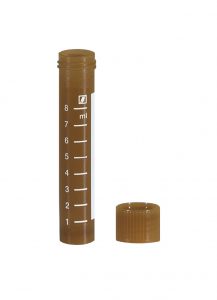Special Communication
April 2018 – Upcoming Changes to Testing
Beginning in April 2018, there will be several testing changes, discontinuations, and additions:
Folate, Red Blood Cell (RBCFLP)
Test Name
Folate RBC (RBCFLP)
Clinical Information
Aids in detecting folate deficiency.
CPT Codes
82747 x 1
85014 x 1
Methodology
Automated Cell Counter and Quantitative Chemiluminescent Immunoassay
Turnaround Time
Testing will be performed Sunday through Saturday.
Reporting time will be 2–3 days.
Specimen Requirements
This test requires multiple specimen tubes.
Separate specimens must be submitted when multiple tests are ordered.
Tube 1:
- Collect 1 ml whole blood in a Lavender BD Hemogard™ K2EDTA Tube.
- Protect tubes from light during collection, storage, and shipment.
- Mix specimen well, transfer into an amber transport tube, freeze, and transport frozen (critical).
Tube 2:
- Collect 2.5 mL whole blood in a Lavender BD Hemogard™ K2EDTA Tube.
- Fill tube to at least half of fill volume, and send refrigerated.
- Note: Minimum volume is 1 mL split between 2 aliquots of 0.5 mL each.
Stability
Folate RBC:
Ambient: 2 hours
Refrigerated: 4 hours
Frozen: 2 months
Hematocrit:
Ambient: 24 hours
Refrigerated: 48 hours
Frozen: Unacceptable
Reference Range
Folate RBC:
≥ 366 ng/mL
Hematocrit:
0 – 14 Days: 39.6 – 57.2%
15 – 30 Days: 30.5 – 45.0%
31 – 60 Days: 26.8 – 37.5%
61 – 179 Days: 28.6 – 37.2%
6 – 23 Months: 30.8 – 37.9%
2 – 5 Years: 31.0 – 37.8%
6 – 11 Years: 32.2 – 39.8%
12 – 14 Years: 33.4 – 46.0%
15 – 99 Years (Male): 39.0 – 51.0%
15 – 99 Years (Female): 36.0 – 46.0%
Special Information
- Hematocrit must be performed and submitted with the order.
- If the patient has not received a transfusion or experienced excessive bleeding between the RBC folate draw and the hematocrit draw, any hematocrit drawn within 24 hours of the RBC folate draw is acceptable.
- Folate RBC tube only: it is critical to submit the specimen as frozen; the specimen must be protected from light during collection, storage, and shipment.
- Separate specimens must be submitted when multiple tests are ordered.
- Specimens that are clotted or non-frozen will be rejected.
- This test is New York DOH approved.
Torch Antibodies Panel, IgG & IgM (TORGMP)
Test Name
Torch Antibodies Panel, IgG & IgM (TORGMP)
Clinical Information
Toxoplasmosis IgM and IgG, Ab: Equivocal results should have a new sample collected and tested 3 weeks later.
Rubella IgG Ab: If exposure to Rubella is suspected and a negative result is obtained, a second specimen should be collected and tested 1-2 weeks later. Equivocal results should have a second sample collected and tested.
Rubella IgM Ab: Parallel testing is preferred and convalescent specimens MUST be received within 30 days from receipt of acute specimens.
Herpes Simplex Type 1 and 2 IgG Antibodies: Equivocal results should be followed up by obtaining a new sample for re-testing.
Herpes Simplex IgM, Abs: A negative result does not rule out a primary or reactivated infection with HSV1 or HSV2 because the sample may have been obtained too early in the course of infection. If a primary infection is suspected, obtain a new sample 1-2 weeks later. Patients with equivocal results should have a new sample collected and tested 1-3 weeks later.
CPT Codes
86644 x 1
86645 x 1
86694 x 1
86695 x 1
86696 x 1
86762 x 2
86777 x 1
86778 x 1
Methodology
Chemiluminescence Immunoassay (CLIA)
Chemiluminescent Microparticle Immunoassay (CMIA)
Enzyme Immunoassay (EIA)
Multiplex
Semi-Quantitative Chemiluminescent Immunoassay
Turnaround Time
Refer to individual components.
Stability
After separation from cells:
Ambient: 8 hours
Refrigerated: 48 hours (note: For Rubella IgM: 2 weeks)
Frozen: 14 days
Reference Range
Refer to report.
Special Information
Grossly hemolyzed, icteric, lipemic, and heat-inactivated samples are unacceptable.
Samples containing particulate matter or exhibiting obvious microbial contamination will be rejected.
Test Updates
Discontinued Tests
EBV by PCR Qualitative (EBPCR)
EBPCR will be discontinued on April 12, 2018.
Discontinuation was originally scheduled for May 8 in the March 2018 Technical Update.
We suggest ordering EBV by PCR Quantitative (EBVQNT).
RBC Folate (FOLRBC)
FOLRBC will be discontinued on April 26, 2018.
We suggest ordering Folate RBC (RBCFLP).
Torch Antibodies, IgG & IgM (TORCH)
TORCH will be discontinued on April 26, 2018.
We suggest ordering Torch Antibodies Panel, IgG & IgM (TORGMP).


